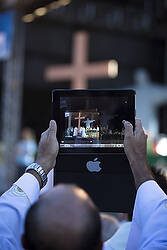"All men," said Aristotle in the Metaphysics, "desire by nature to know."
I think Aristotle is right, and I see this confirmed almost every day with my own students. It is confirmed everywhere, in fact. Our culture centers itself around the acquisition of knowledge, on mastering bits -- and now bytes -- of information. In modern academia, to know something is to master something, to have it figured out. Modern textbooks (from early in a child's life) reinforce this, whether it's biology, history or math. Each chapter has precise learning objectives; each chapter contains bolded or highlighted key words. The books convey completeness, precision and clarity. To work through the books is to feel that one is gaining ground, that one is acquiring valuable, eternally valid information. It leaves one feeling satisfied.
On one level, this is a very good thing. Our creator has imprinted His intelligibility on the world. This intelligibility, this capacity for things to be figured out, offers reason to praise. It is the basis for remarkable human achievement across vast fields of knowledge. More than that, it allows for the very possibility of knowledge.
And yet, part of a teacher's task, particularly in theology, is to help students see that knowledge can be of a different sort, that an object of knowledge can be filled with mystery. There are realms of understanding that cannot be neatly packaged or empirically assessed. The nature of the self, the ways of love, the meaning of faith, God, happiness, conversion -- these matters (like many others) are inherently uncertain, not reducible to an equation or formula. The more we know of them, the more we appreciate their elusiveness. To make sense of them requires years of experience, personal encounter, trial and error, and the kind of patience that comes through grace. They are not subjects that can be solved; they are subjects that we live, journey through, and try to become better at.
Our students can intuit these other realms and sense something beyond the horizon, but they struggle with the uncertainty. Wrestling with big questions can leave them feeling defeated or frustrated. From my view, I can see this as the necessary growing pains, as the exhausted muscles of the mind, but for students it can seem like an invitation to futility. The questions can seem so distant, so unverifiable...
Today's teacher, then, especially at a Catholic school, faces an immense opportunity and challenge. To help students integrate the knowledge of physics with the knowledge of the New Testament, two plus two equals four with three persons in one. To enable students to believe in both the iPad and the Trinity, and to see the former as the result of the latter.








